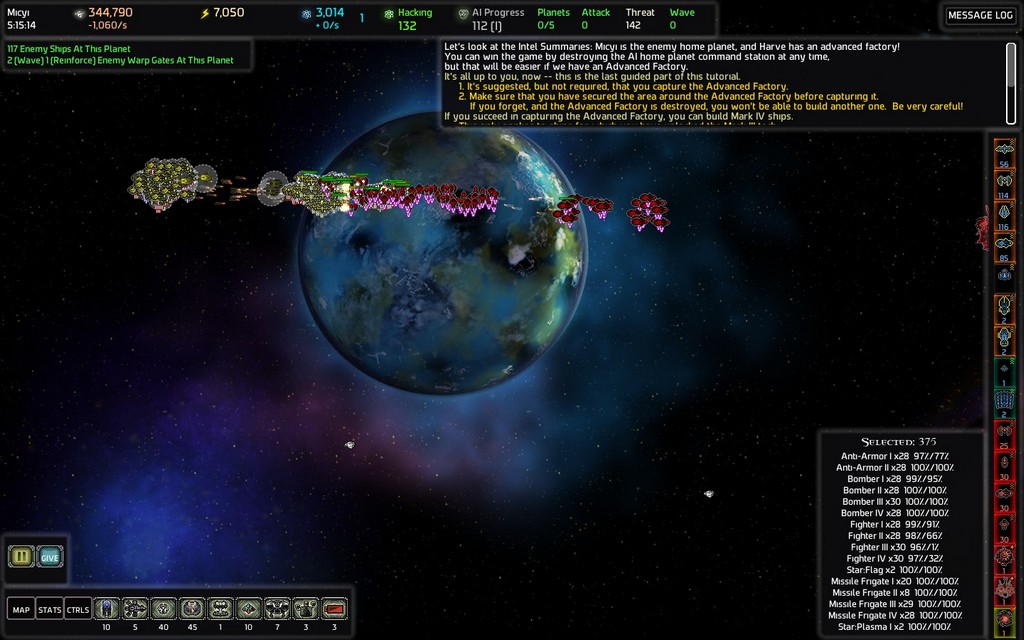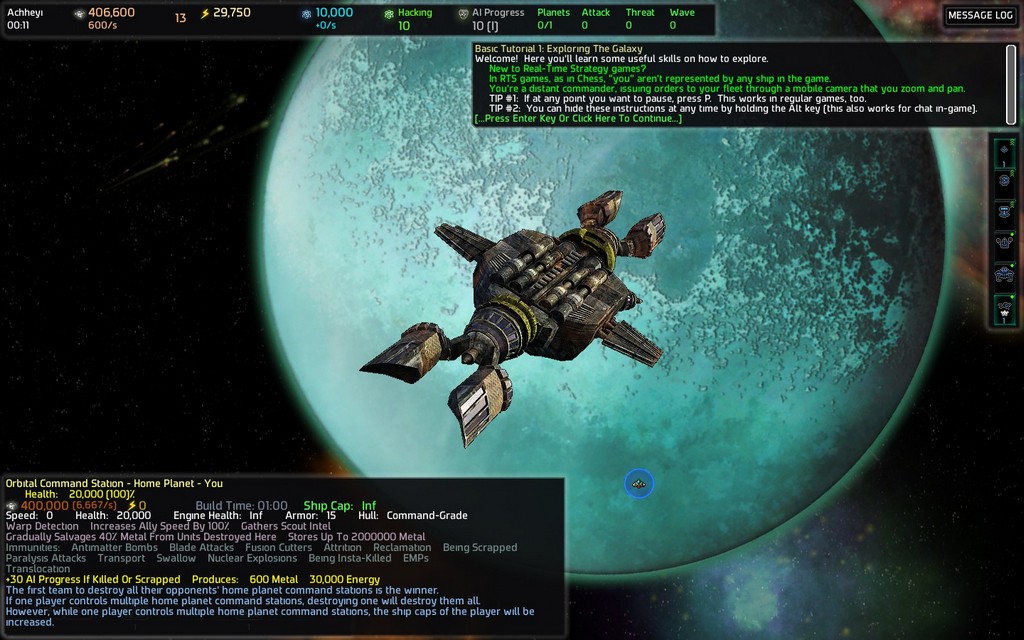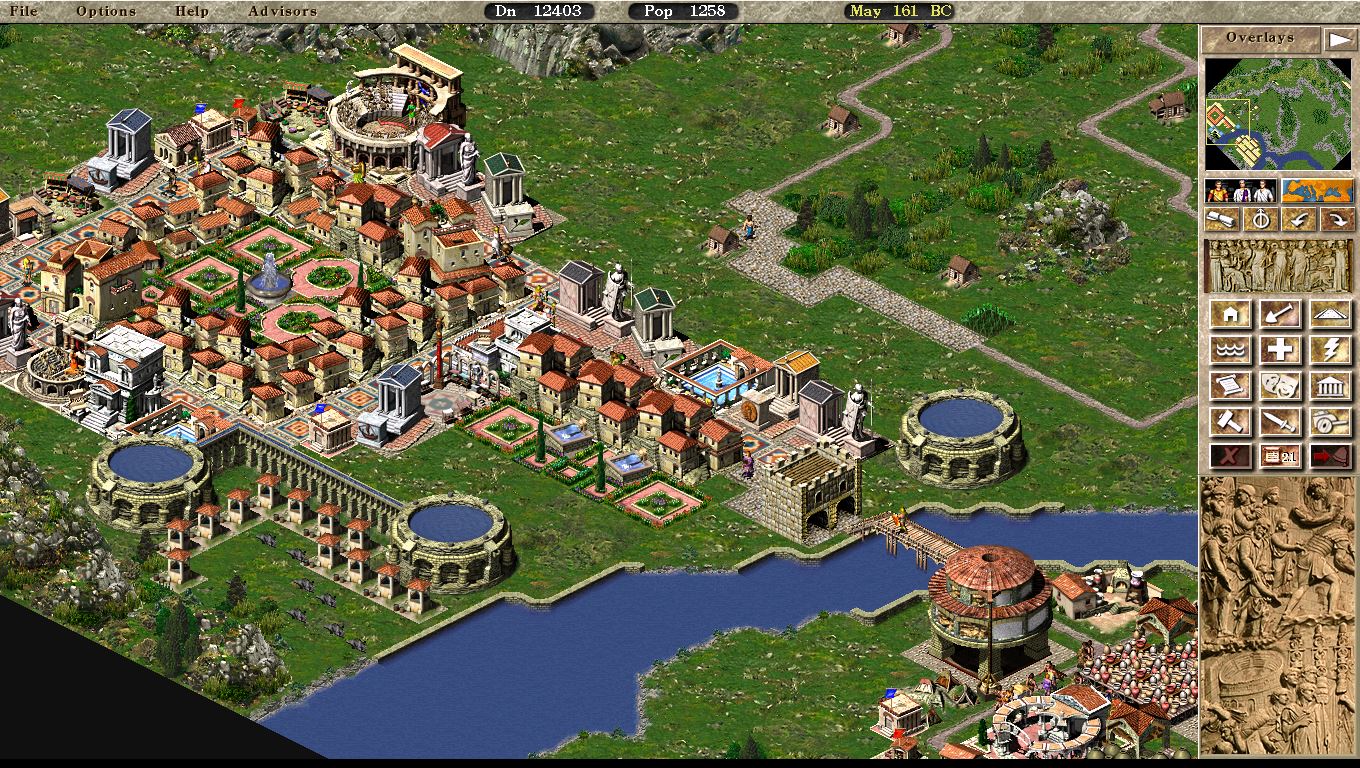
I have a nasty habit when it comes to strategy games. I install them, play them once, get frustrated when I lose, and never play them again. It’s happened more times than I can count. From real-time strategy games to city-building games to turn-based strategy games to tactical RPGs, the length of gameplay may vary, but the outcome is always the same. I close the game in frustration and leave it to rot in my Steam library, never to grace my screen again. At least, until a couple of weeks ago.
I got a bit of a wild hair and decided to figure out what makes strategy games tick. I have many friends who love these games, and our tastes align very closely in other video games areas, so I have to imagine that I’m just missing something. I decided to take a few days to really dig into a strategy game and try to find that something.
The game I chose for this task was AI War: Fleet Command, a space-based, real-time strategy game from 2009. I’d like to say that I picked this one because it looked cool, or because a friend recommended it, but the truth is, it was the first one listed alphabetically when I went to my Steam account. Had I done my research, I probably wouldn’t have picked this one, since most people say it’s extremely difficult. But, in the naiveté of my strategy-game youth, I installed the game and set myself to figure it out.

AI War: Fleet Command is a neat little strategy game. There’s not a lot of story, but I actually do like what’s presented. Essentially, the story takes place in the aftermath of a war fought almost entirely with artificial intelligence. At some point, the AI turned on humans, threatening to wipe them out. This forced the human militaries to forget their past animosity, band together, and defeat this new threat to save the human race. The bulk of the battles you fight take place late in the war, after the AI has already decimated most of humanity. In the basic setup, you start as the underdog, attempting to build a force to defeat two AI enemies stretched across 60-to-80 planets. There are, of course, different ways to adjust a bunch of different factors when you set up a game, and once I finished the brief tutorial, I was already overwhelmed. I decided to just start with the recommended settings and see how far I could actually get.
What followed was 30 hours of throwing spaceships at AI opponents, losing space battles, attempting to recoup my losses, rebuilding my fleet, and taking the fight back to the AI. When the words “You Win!” finally graced my screen in neon green, I felt a rush of adrenaline and excitement. And I knew, in that moment, that I got it. This was what I was missing. The exhilaration of building a plan and then watching that plan come together in a culmination of different battles to achieve ultimate victory is quite unlike anything I’ve felt before.
I think I understand the appeal of strategy games now.

Of course, understanding the appeal and actually feeling like that appeal is worthwhile are two vastly different things. For strategy games, I’m still not entirely sure where I land. While I really enjoyed that final victory, I struggled to find much fun in the many, many battles I fought to achieve that victory. In the day-to-day minutiae of war, I kind of got bored, which is better than frustration, I guess. It’s not that I didn’t like the strategy aspect, but these games require a lot of micromanaging. Selecting all of your ships and clicking on a single enemy base to concentrate your fire is an easy enough concept to grasp, but where do you put your turrets to achieve the most effective defense? When do you determine that a battle is lost and you need to retreat to minimize your losses? When you have multiple bases, where do you concentrate your fleet? How many ships do you leave at each base to help defend? When the enemy attacks you, how should you respond? All of these questions are fairly common in strategy games, and there are people who absolutely love to invest the time needed to answer them. I’m just not sure I’m one of those people at this point.
Not every game is made for every person, and while that line gets trotted out by Dark Souls fans anytime the difficulty/accessibility discourse begins (in which case I believe it is largely bullshit), there is truth to the idea that different aspects of a game reward players differently, and the value of those rewards is set by the player. I play a lot of games for different reasons, but all of those reasons tend to reward me on a consistent basis. If I’m into the story, it’s the narrative moments. If I’m into a platformer, it’s completing a particularly difficult stretch of jumps. I don’t get much of a reward in completing a single battle in a strategy game, because I know that afterwards there are going to be a million other factors and decisions I need to focus on. Without that consistent reward, I have a hard time staying focused on the game long enough to achieve that rush of adrenaline when I strike the final blow. I just don’t think the pleasure centers of my brain, nor my short attention span, work that way, and that’s okay!

But, I am willing to believe I could be wrong. Not long after I finished my AI War: Fleet Command campaign, I randomly pulled up a city-building simulation game from 1998 called Caesar III. I installed Caesar III during my last attempt to get into this style of game, and I quickly gave up after a few hours of getting nowhere. This time, my experience was a little different. On one particular level that I had struggled with previously, I made a major change to my build and then actually took a moment to watch my city move.
Caesar III is a game in which the movement of your city helps it develop. When you place a house and a citizen moves in, the house begins to desire resources, like water, food, furniture, entertainment, and religion. Some of these resources are simple. For example, to meet a house’s need for water, you just need to drop a fountain within a certain distance. Other resources are more complex, requiring not only workshops to make the resource, but also warehouses to store the wares and markets to distribute them. So after making any major changes, the city developer has to be patient and let them trickle down into minor changes in how the city looks and functions. There’s an inherent patience required, and it’s a patience that I’m not sure I’ve ever taken the time to foster.
When I chose to just sit and watch how a big change developed in my city, I started to see how I could make that development more stable and efficient, such as moving a market to a different area of the residential block. I didn’t feel a desire to just move onto the next major change immediately and hope everything stabilizes down the road. Trust me when I say that playing the game this way is vastly different to how I tried to play these games in the past.
While it is true that strategy and simulation games are considered separate genres, they do require a similar skillset. Both genres involve resource development, strategic planning, efficient execution, and the step-by-step management of all of those factors. I think my victory in AI War: Fleet Command, although fleeting, helped me develop some of these skills. I can see a throughline from my experience playing AI War: Fleet Command to the way I’m playing Caesar III now, and I’m better at the game because of it.
While I’m not quite done with Caesar III yet, I have gotten farther in the game than I ever have, and it’s been easier and more enjoyable. It’s still not my favorite style of game, and I’m still not sure that the small victories are rewarding enough on their own. But I’m beginning to wonder if, perhaps, there may be a strategy gamer somewhere within me that has yet to fully emerge.



